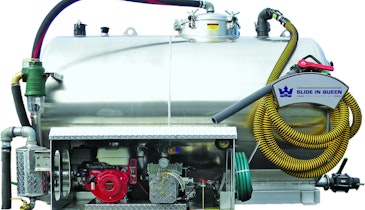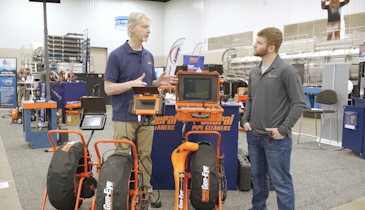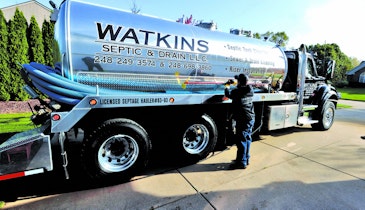Over the past year, the Georgia Onsite Wastewater Association has been embroiled in a battle over adequate disposal options for its members. Tipping fees at municipal wastewater treatment plants escalated dramatically. As they reached capacity, many plants began refusing septage. And many pumpers, deeming new Guidelines for Land Application from the state Environmental Protection Division as restrictive and expensive, surrendered their permits.
Today, 15 approved application sites serve 159 counties. Data from the state Department of Public Health shows the number of licensed pumpers dropping from 1,682 in 2011 to 784 by March 2012. Dart Kendall, president of GOWA and owner of Advanced Septic in Acworth, worked with association lobbyist Bruce Widener and assistant EPD director Jim Ussery to
bring changes.
GOWA proposed bills to establish stable disposal sites and reduce disposal fees. The EPD endorsed both of them, but only legislation delaying the land application rules for two years became law. "The way they wrote the rules scared members to death," Kendall says. "Upon reading the details, the regulations were even worse than they first appeared."
Pumper: How did the situation develop?
Kendall: In 2007, the association pushed for moving land application regulations from the state Department of Community Health to the EPD. Under Community Health, a county commissioner must approve new application sites. Not one site was approved because they didn't want them in their back yard. If the EPD approves a site, it happens.
Our request was granted and the EPD had five years to write the regulations. This division issues permits for systems larger than 10,000 gpd, including municipal wastewater treatment plants. The application guidelines were designed for them and would become effective in July 2012.
Pumper: Wasn't the association involved in the rule writing?
Kendall: No. We didn't see a copy until the rules were far into the 2012 legislative session, which runs from January through March. I tried meeting with Jim Ussery before the rules became effective, but it took a month and by then the legislation had become law.
I spent most of a day explaining our concerns to Jim. Once he understood our situation and goals, he supported our bill to delay implementing the rules for two years, and he is now meeting with us and other stakeholders to rewrite the legislation.
Jim also supported our bill that would allow pumpers to dewater septage, then dispose of the liquid in a dedicated onsite system on their property. He even proposed language about screening septage before dewatering and got it to me in one day.
The Department of Community Health successfully opposed the bill, arguing that they needed to hire staff with the expertise to regulate dewatering. We argued that there was no reason to regulate dewatering until sound scientific evidence proved it caused health problems. To the best of our knowledge, there has never been a documented case of it.
Pumper: How did you manage to pass the delay bill in three months?
Kendall: Without a state onsite organization and lobbyist Bruce Widener, we would not have had a chance. Bruce knew which committee had the bill and, if it passed, where it would go next before reaching the floor for a vote. Once we knew which senators were on the committees, we asked members who were constituents to call them, discuss the bill, and request that they meet with Bruce and me. That was the only way we got in the door. After talking with us, they helped push the bill through their committee.
Pumper: What changes are you proposing in the regulations?
Kendall: For starters, reduce the amount of monitoring and reporting. (The rules) are designed for municipal plants with operators who test samples two or three times a day and record the results. If pumpers want to do the analytical procedures, they need a special operator's license that is attainable only by working at a municipal plant and taking the exam. Depending on how much septage pumpers apply, it appears as if they must sample daily for 18 pollutants, then send the samples to certified wastewater or commercial environmental laboratories. Based on my experience as a licensed wastewater operator in Tennessee, testing will cost $800 per day.
Pumper: What is happening to pumpers who close their sites?
Kendall: Tommy Chambliss of Cataula testified before GOWA's board that he and his father land-applied on their alfalfa fields for 50 years and never once had a bad soil report. Tommy turned in his permit, and his report is indicative of the situation.
The nearest municipal treatment plant is 90 miles away from his business. Tipping fees per 1,000 gallons have increased from $40 to $300 or $350. DeKalb County just increased it to $400. Confirming prices is difficult because they keep changing. Add to the tipping fee the cost of depreciation on the truck, man-hours, and diesel fuel at more than $4 per gallon and Tommy anticipates charging $1,000 for pump-outs. Now consider this:
We pump a lot fewer tanks per contractor than most states because Georgia doesn't require risers. A service call often involves locating the 1,000-gallon tank, then exposing it with the excavator pulled on a trailer behind the vacuum truck. The state has no mandate to pump tanks. The calls we get now are when sewage backs into the house and bubbles up in the yard. Owners frequently tell us that the tank hasn't been serviced in 25 years.
Tanks like that often have scum layers hard and dense enough to support a man's weight. Our truck has air to roil the tank, but pumping is still difficult and can take two hours. The blower wasn't designed to run continually and wears out faster. Pumping one tank per day and driving 90 miles to offload becomes a very expensive enterprise.
Pumper: How serious is the reduction of municipal plants accepting septage?
Kendall: It's become critical. The City of Dallas recently stopped accepting septage. Our members reported that the facility in Macon will accept septage, but only if it comes from Bibb County. The counties around Bibb have no plants, so some pumpers falsify addresses to offload and risk losing the right if they're caught.
The crisis has increased the temptation to dispose of septage illegally. Atlanta is reporting backups in subdivisions with infrastructure but no houses. We just increased the cost of our pump-outs to $350, which is average, but it's creeping up. In this economy, few homeowners can afford it. Our members are finding pumps in septic tanks with hoses running to the woods or creeks.
Pumper: What is the association considering to improve the situation?
Kendall: One suggestion is to itemize the invoice into service call, fuel, tipping fee and at which plant. Customers must understand how companies determine a fair price. I include the county commissioner's phone number and encourage customers to use it.
Many members I talked to would apply for land application permits if the regulations changed. Without a confirmed disposal site, most companies aren't marketing routine maintenance because they don't know what to charge for pump-outs and where they will go with it.
Another suggestion is to let the private sector operate land-applied sites. That will create jobs and a competitive market to regulate prices.
We're also working with portable restroom operators. It's harder for them to dispose of septage at municipal plants because the blue dye in the deodorant affects turbidity levels.





